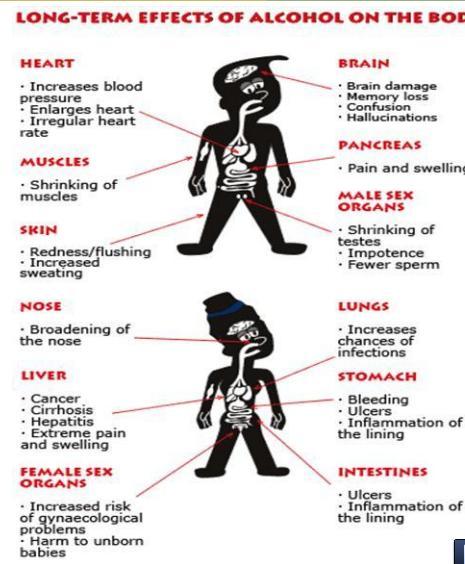Alcohol addiction
Alcohol addiction
Alcohol is the most widely used intoxicant in the world. It affects the user as well as people around them. Alcohol like any other mind altering chemical, affects the brain’s pleasure circuit. Over time the brain actually changes in certain ways so that a powerful urge to use alcohol controls the persons’ behaviour.
Who is at risk?
ANY alcohol consumption is likely to be unsafe if the individual has:
- A family history of addiction
- A past history of alcohol related problems
- Underlying physical illnesses or risk to illness that can get worsened by drinking
- Psychological problems like anxiety and depression
- Been a temperamental child or adult with high levels of anger, impulsivity, moodiness and anxiety
ANYONE who drinks alcohol may be at risk to develop problems from alcohol use.
- One in two persons who drink alcohol has a chance of developing an alcohol related problem in their life.
- Alcohol is associated with more than 60 diseases, some of which are shown in the accompanying picture.
- It is also well-known that regular and heavy drinking is associated with early death, accidents and violence.
For most people, regular or heavy alcohol drinking brings with it health problems, financial problems and problems with the family, work and society. Alcohol must NOT be used as a medicine or self-treatment for curing anxiety, stress or sadness.
When does alcohol drinking become a problem?
Alcohol can cause problems in ANY person when it is:
- Used in excess on one drinking occasion till a person is drunk (INTOXICATION), leading to change in behaviour and risk taking
- Consumed in excess, i.e. more than 2-3 drinks (1 drink is 30 ml of hard spirits, 60 ml wine) on a drinking occasion, daily or near-daily drinking (AT RISK drinking)
- When it is used in situations where even the slightest mistake in judgment can cause serious problems (drunken driving, operating machinery, etc)
- Consumed in a BINGE pattern (more than 5 drinks on one occasion) even if the person is not drinking between binges
- Taken even when the person has already experienced harm (physical or psychological)- called HARMFUL drinking
- Used in a DEPENDENT fashion (i.e. the user is ADDICTED). Dependence is defined as repeated use of alcohol to the point where it causes problems in multiple life areas. This is often called addiction, which refers to brain changes occurring with repeated use of alcohol.
How do I know if I have a problem with alcohol?
Take some time to reflect on these questions below…
- I felt that I should cut down on my drinking?
- I have been annoyed by the criticism I received by other people because of my alcohol consumption?
- I have had guilty feelings about drinking?
- I have needed to drink alcohol in the morning as an eye opener?
If you have answered yes to one of the above questions you may have a drinking problem, and if yes to two or more of the above questions, you are very likely to have a drinking problem and need help.
Am I dependent on alcohol?
Take some time to reflect on these questions below…
- I often have a strong desire to consume alcohol, for which I’m not able to control myself.
- On many occasions I decided to stop / reduce the amount of alcohol I would drink but would end up drinking more than I thought.
- Over time I required a lot more than what I used to drink to give me pleasure.
- If I stopped drinking by myself I would get irritated, my hands would shiver, my sleep decreased, etc. and in order to stop this feeling I drink again.
- I spend a lot of time in thinking about alcohol and how I would get it.
- I know drinking alcohol is harmful but I find it difficult to stop.
If you have agreed to 3 or more of the above mentioned statements and following this pattern for over a year, you are most likely to be dependent on alcohol.
Long term effects of alcohol on the body
a
What is the best way to avoid any problems with alcohol?
- Clearly the best way to avoid ANY PROBLEM with alcohol is to AVOID alcohol.
- Be SMART- weigh the pros and cons and make your own decision.
- If friends pressurise you - learn to say NO
- Remember, no one HAS to drink alcohol to stay healthy and well and to have friends
Source : Centre for Addiction Medicine, NIMHANS, Bangalore
చివరిసారిగా మార్పు చేయబడిన : 2/20/2020
Causes for cardiovascular diseases, types, symptom...
